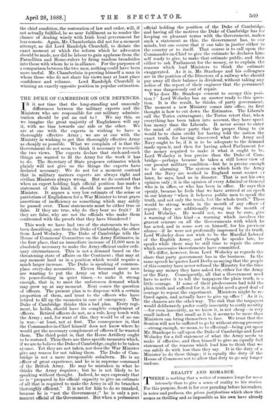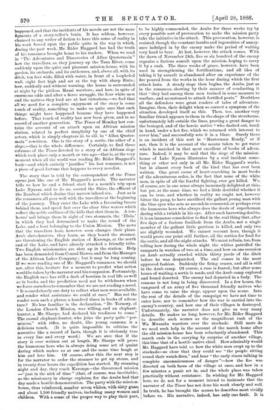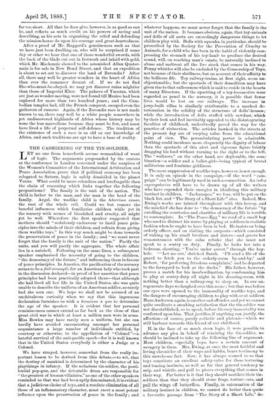REALITY AND ROMANCE.
MHERE is nothing that a writer of romance longs for more intensely than to give a sense of reality to his stories. For this purpose, Scott is for ever parading before his readers, in notes and prefaces, the pieces justificatives which show that scenes as thrilling and as impossible as his own have already happened, and that the incidents of his novels are not the mere figments of a story-teller's brain. It has seldom, however, chanced to any writer of fiction to have this sense of reality in his work forced upon the public quite in the way in which, during the past week, Mr. Rider Haggard has had the truth of his romances brought home to his readers. When we read in"The Adventures and Discoveries of Allan Quatermain" how the travellers, as they journey up the Tana River, come suddenly upon the quiet and pleasant mission-house, with its garden, its orchards, and its outhouses, and, above all, with its ditch, ten feet wide, filled with water, in front of a loopholed wall, eight feet high and set at the top with sharp flints ; how, suddenly and without warning, the house is surrounded at night by the pitiless Masai warriors ; and how, in spite of enormous odds and after a fierce struggle, the four white men and the natives they lead are at last victorious,—we feel that all we need for a complete enjoyment of the story is some touch of reality, something to make us quite sure that such things might have happened because they have happened before. That touch of reality has now been given, and in no record of another generation. The Times of Monday last con- tains the account of an attack upon an African mission station, related in perfect simplicity by one of the chief actors, which is simply chapters iii. to viii. in "Allan Quater- main" rewritten. One is the story of a sortie, the other of a siege,—that is the whole difference. Certainly, to find three columns of the Times devoted to a story of an African siege which took place only a month or two ago—that is, at the very moment when all the world was reading Mr. Rider Haggard's book—and which entirely " justifies " his last romance, is not a piece of good fortune that happens to every novelist.
The story that is told by the correspondent of the Times opens just like one of Mr. Haggard's novels. The narrator tells us how he and a friend start for a month's trip upon Lake Nyassa, and to do so, ascend the Shire, the affluent of the Zambesi which drains that narrow inland sea. Just as in the romances, all goes well with the travellers at the beginning of the journey. They enter the Lake with a favouring breeze behind them, and speed fast over the clear blue waters which reflect the noble outlines of the hills that shut them in. A ten- hours' sail brings them in sight of two steamers, the Biala,' in which they had determined to make the round of the Lake, and a boat belonging to the Union Mission. The news that the travellers hear, however, soon changes their plans. Arab slave-hunters, they learn, as they board the steamer, are threatening the English station of Karonga, at the north end of the Lake, and have already attacked a friendly tribe. Two English missionaries are shut up in the station. Help has been demanded from Consul Hawes, and from the Manager of the African Lakes Company ; but it may be long coining. If we were reading one of Mr. Haggard's romances, we should not, after this, hesitate for a moment to predict what action would be taken by the narrator and his companion. Fortunately, the English race has still a dash of heroism in real life as well as in books, and the prediction need not be withdrawn when we force ourselves to remember that we are not reading a novel. "It seemed clearly our duty to collect what men were available, and render what assistance we could at once." Has not the reader seen such a phrase a hundred times in books of adven- ture ? No less familiar is the declaration, "Dr. Tornory, of the London Church Mission, was willing, and an elephant- htmter, a Mr. Sharpe, had declared his readiness to come." The casual elephant-hunter, who joins the party quite " per- miscus," with rifles, no doubt, like young cannons, is a delicious touch. (It is quite impossible to criticise the narrative like a record of facts, though it is obviously true in every line and every word.) We are sure that if the story is ever written out at length, Mr. Sharpe will prove the humorous hero who is always doing some act of quaint daring which makes us at one and the same time laugh at hint and love him. Of course, after this, the next step is for the narrator to order the steamer to get up steam, and in twenty-four hours the expedition has started. By steaming night and day, they reach Karonga—the threatened mission —"just in the nick of time" (that, of course, was inevitable), as the missionary in charge explains, for the Arabs had that day made a hostile demonstration. The party with the mission- house, thus reinforced, number seven whites, with sixty guns, and about 1,500 friendly natives, including many women and children. With a sense of the proper way to play their part, to be highly commended, the Arabs for three weeks try by every possible sort of provocation to make the mission party take the initiative in the attack. This provocation, however, is resisted, though the constant insults and ingenuities of annoy- ance indulged in by the enemy make the period of waiting very hard to bear. At last, however, the attack comes. With the dawn of November 24th, five or six hundred of the enemy organise a furious assault upon the mission, hoping to carry it by a rush. The three weeks of grace, however, have been used in strengthening the fortifications; and all idea of taking it by assault is abandoned after an experience of the fire poured from the works in the hour during which the first attack lasts. A steady siege then begins, the Arabs, just as in the romances, showing by their manner of conducting it that "they had among them men trained in some measure to warfare, and accustomed to attack fortified posts." Doubtless all the defenders were great readers of tales of adventure. Imagine, then, their delight when so correct a symptom of the situation developed itself as this. Then, too, another very familiar friend appears to them in the shape of the storehouse, unfortunately left outside the lines, proving a great danger to the besieged, and of the heroic native "who dashed out, torch in hand, under a hot fire, which we returned with interest to cover him," and successfully sets it in a blaze. Surely there is an incident of this sort in " Maeterman Ready," or if not, then it is the account of the means taken to get water which is matched in that most excellent of books of adven- ture. Indeed, it may be said that the siege of the mission- house of Lake Nyassa illustrates by a real incident some- thing or other not only in all Mr. Rider Haggard's works, but in almost every book of the kind that has ever been written. One great cause of heart-searching in most books of the adventurous order, is the fact that none of the white men, in spite of all the fearful fighting, ever get killed. We, of course, are in one sense always immensely delighted at this; but yet, at the same time, we feel a little doubtful whether it can be true, and whether in reality we ought not, however bitter the pang, to have sacrificed the gallant young man with the blue eyes who acts as second-in-command, or perhaps even the humorous hero who always does the deeds of superhuman daring with a twinkle in his eye. After such harrowing doubts, it is an immense consolation to find in the real thing that, after five days of a furious fusillade from the Arabs, not a single member of the gallant little garrison is killed, and only two are slightly wounded. We cannot recount here, though it would prove our point still further, all the sorties for food for the cattle, and all the night attacks. We must refrain, too, from telling how during the whole night the whites patrolled the ramparts in watches of two at a time, and how on one occasion an Arab actually crawled within thirty yards of the ditch before he was despatched. The end comes in the most approved fashion. Suddenly the firing ceases, and all is still in the Arab camp. Of course, a ruse is feared; but after some hours of waiting, a sortie is made, and the Arab camp explored and found deserted. The enemy had departed in a body. The reasons is not long in being discovered. In a few hours, the vanguard of an army of five thousand friendly natives who have come to raise the siege, appear upon the scene. Into the rest of the details of the campaign we have not time to enter here, nor to remember how the war is carried into the enemy's country', and how one of their villages is destroyed. Unfortunately, the narrator does not give us very many details. He makes us long, however, for Mr. Rider Haggard to describe such scenes as the magnificent rush of the Wa litwamba warriors over the stockade. Still more do we need such help in the account of the march home after the old mission-house has been reluctantly abandoned. This march ends in the carrying by surprise of another village, this time that of a hostile native chief. How admirably would Mr. Haggard have told us how the white men crept up to the stockade—so close that they could see "the people sitting round their watch-fires," and hear "the early risers talking in complete unconsciousness of danger "—how the fire was directed on both faces of the village at once, and how in a few minutes a panic set in, and the whole place was taken practically without resistance. In wishing for Mr. Haggard here, we do not for a moment intend to insinuate that the narrator of the Times has not done his work clearly and well. In truth, he has brought the scenes he describes most vividly before us. His narrative, indeed, has only one fault. It is
far too short. All that he does give, however, is as good as can be, and reflects as much credit on his powers of seeing and describing, as his acts in organising the relief and defending the mission-house do upon his courage and great-heartedness.
After a proof of Mr. Haggard's genuineness such as that we have just been dwelling on, who will be surprised if some day or other we hear that one of those wonderful swords, with the back of the blade cut out in fretwork and inlaid with gold, which Mr. Mackenzie showed to the astonished Allan Quater- main is for sale in New Bond Street, and that an expedition is about to set out to discover the land of Zuvendis ? After all, there may well be greater wonders in the heart of Africa than ever the romancer dreamt of. If we do not find She-who-must-be-obeyed, we may yet discover ruins mightier than those of Imperial Khor. The palaces of Yucatan, which are just as wonder-moving, were not found till Mexico had been explored for more than two hundred years ; and the Cam- bodian temples had, till the French conquest, escaped even the gatherers of rumour. Again, if the Zuvendis race is not made known to us, there may well be a white people somewhere in yet undiscovered highlands of Africa whose history may be none the less marvellous because they must be few, and must have lived a life of perpetual self-defence. The tradition of the existence of such a race is as old as our knowledge of Africa, and such traditions are apt to have a base of reality.




































 Previous page
Previous page